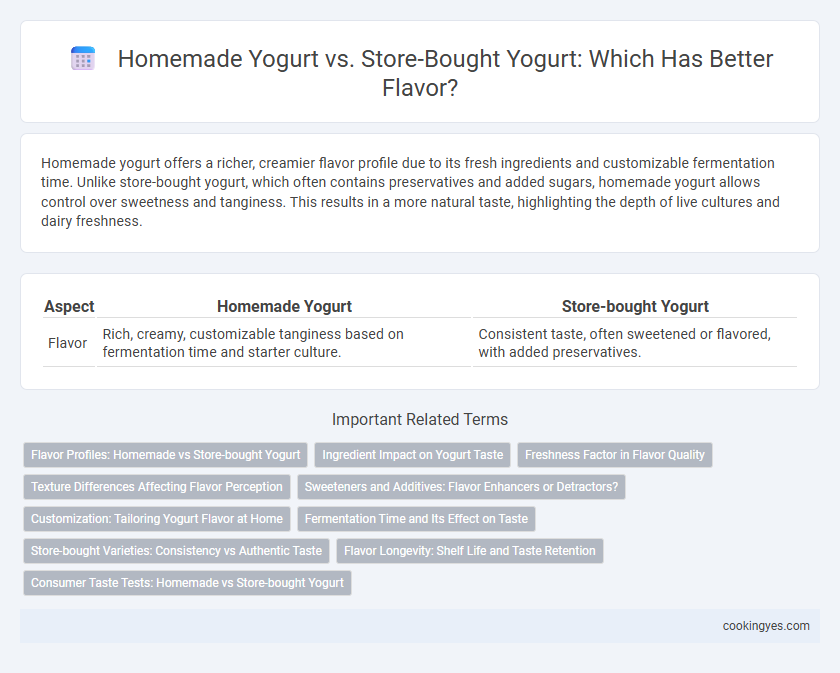Homemade yogurt offers a richer, creamier flavor profile due to its fresh ingredients and customizable fermentation time. Unlike store-bought yogurt, which often contains preservatives and added sugars, homemade yogurt allows control over sweetness and tanginess. This results in a more natural taste, highlighting the depth of live cultures and dairy freshness.
Table of Comparison
| Aspect | Homemade Yogurt | Store-bought Yogurt |
|---|---|---|
| Flavor | Rich, creamy, customizable tanginess based on fermentation time and starter culture. | Consistent taste, often sweetened or flavored, with added preservatives. |
Flavor Profiles: Homemade vs Store-bought Yogurt
Homemade yogurt boasts a rich, tangy flavor with customizable intensity depending on fermentation time and starter culture selection, offering a fresh and natural taste often missing in store-bought varieties. In contrast, store-bought yogurt typically contains added sweeteners, stabilizers, and fruit flavorings that create a consistent but less complex flavor profile. The live cultures in homemade yogurt develop unique, probiotic-driven notes, making the flavor more vibrant and dynamic compared to the milder, sometimes artificially enhanced taste commonly found in commercial yogurts.
Ingredient Impact on Yogurt Taste
Homemade yogurt offers a richer and tangier flavor due to the use of fresh, high-quality milk and live active cultures that can be customized for fermentation time and temperature. Store-bought yogurt often contains stabilizers, sweeteners, and flavor additives that can mask the natural taste and reduce the depth of flavor complexity. The selection of milk fat content and bacterial strains in homemade yogurt directly influences its creaminess and sourness, making ingredient control critical for superior taste.
Freshness Factor in Flavor Quality
Homemade yogurt offers superior flavor freshness due to the absence of preservatives and the ability to control fermentation time, resulting in a tangier, creamier taste profile. Store-bought yogurt often contains additives and stabilizers that can dull the natural flavors and diminish freshness over time. The freshness factor in homemade yogurt significantly enhances flavor quality by preserving the live cultures and maintaining a vibrant, authentic taste.
Texture Differences Affecting Flavor Perception
Homemade yogurt typically has a creamier, thicker texture due to controlled fermentation and the absence of stabilizers found in store-bought varieties, which enhances the richness of its flavor. Store-bought yogurt often contains additives that create a uniform, smoother texture, sometimes masking subtle taste nuances. The texture difference directly affects flavor perception, with the denser curds in homemade yogurt allowing a more intense, complex taste experience.
Sweeteners and Additives: Flavor Enhancers or Detractors?
Homemade yogurt offers control over sweeteners, allowing the use of natural options like honey or fruit, which enhances flavor without artificial additives. Store-bought yogurt often contains added sugars, artificial sweeteners, and flavor enhancers that can mask the natural tartness and texture of yogurt. These additives may detract from the authentic taste, making homemade yogurt a purer and more customizable flavor experience.
Customization: Tailoring Yogurt Flavor at Home
Homemade yogurt offers unparalleled customization, allowing control over fermentation time, milk type, and probiotic strains, resulting in distinct flavor profiles tailored to personal preferences. Adjusting sweetness, tanginess, and adding natural flavorings like vanilla, honey, or fruit enhances the yogurt's taste far beyond standard store-bought varieties. This customization empowers consumers to create unique, fresh, and nutrient-rich yogurt that aligns perfectly with their desired flavor intensity and texture.
Fermentation Time and Its Effect on Taste
Fermentation time significantly influences the flavor profile of homemade yogurt, typically resulting in a tangier and more complex taste compared to store-bought varieties. Homemade yogurt undergoes longer fermentation periods, allowing beneficial bacteria to develop richer flavors and a creamier texture. In contrast, commercial yogurts often have shorter fermentation times to ensure consistent taste and shelf stability, which can result in milder flavors.
Store-bought Varieties: Consistency vs Authentic Taste
Store-bought yogurt offers consistent texture and flavor due to controlled production processes, making it a reliable choice for consumers seeking uniformity. However, this consistency often comes at the expense of the authentic, tangy taste found in homemade yogurt, which varies with fermentation time and live cultures. Commercial yogurts frequently include stabilizers and sweeteners, impacting flavor authenticity compared to the natural profiles developed in homemade batches.
Flavor Longevity: Shelf Life and Taste Retention
Homemade yogurt often retains a fresher, more complex flavor profile due to live cultures and lack of preservatives, but its shorter shelf life can lead to faster taste degradation, typically lasting about one to two weeks in the refrigerator. Store-bought yogurt is engineered for extended shelf life, often up to several weeks, through pasteurization and additives, which can result in a more consistent but less vibrant taste over time. Flavor longevity in homemade yogurt diminishes as probiotic activity decreases, whereas store-bought yogurt maintains flavor stability longer, albeit sometimes at the cost of reduced freshness and authenticity.
Consumer Taste Tests: Homemade vs Store-bought Yogurt
Consumer taste tests reveal that homemade yogurt often boasts a richer, creamier texture and a more pronounced tangy flavor compared to store-bought varieties. Many participants appreciate the ability to customize homemade yogurt with different milk types and fermentation times, resulting in unique flavor profiles. Store-bought yogurts tend to vary widely in sweetness and additives, which can affect natural taste preferences and overall flavor satisfaction.
Homemade Yogurt vs Store-bought Yogurt for Flavor Infographic

 cookingyes.com
cookingyes.com